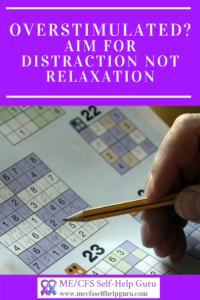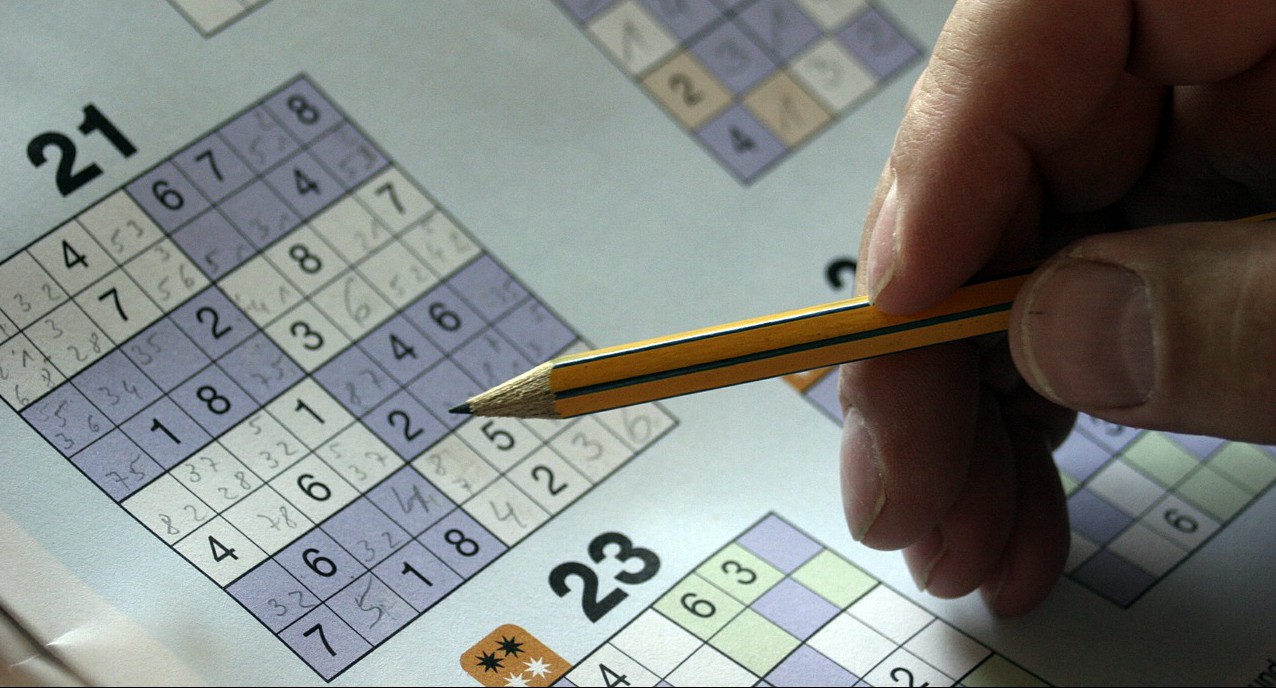With illnesses like ME/CFS and Fibromyalgia it can be very difficult to relax. One of the illness mechanisms seems to be an overstimulation of the sympathetic nervous system (SNS) and an inability to engage the parasympathetic nervous system (PNS). This is often a lot worse if we’ve over-done it in any way. It can be extremely frustrating to know that you need to relax in order to get over doing too much but find it practically impossible to do so.
Many of us try very hard to practice relaxation and meditation skills in the knowledge that engaging the parasympathetic nervous system will give our body the best chance to heal itself. Sometimes, however, this becomes counterproductive. If lack of success leads to frustration we just add further stimulation to the sympathetic nervous system!
In these cases my advice is always give up on trying to relax and instead, distract yourself with a calming single-pointed focus activity. The right kind of distraction can help lower your level of stimulation, possibly even to a level where relaxation (with a non-judgemental accepting attitude) becomes possible again.
The main reason that this works, is that it will stop you feeding back into the stimulation with worries about the symptoms you’re experiencing or frustration at your inability to relax. This kind of distraction needs to engage you enough to stop you thinking about other things, but needs to be calming enough to allow your stimulation levels to drop. I find doing a relatively easy Sudoku works for me, I deliberately aim to do it slowly too, and don’t allow myself to write in more than one number before taking another breath. Other people might find crosswords, colouring, audiobooks, or reading short articles in a magazine do the trick. The most important thing is that the activity engages without excitement or frustration.
It’s also important to value what you are getting out of the activity. You may not be getting the full benefits of quality relaxation, but at least you are able to take control of reducing your SNS stimulation and this is very valuable. Interrupting the loop of stimulation; stopping symptoms perpetuating is the most valuable thing you can do in this moment! It will be impossible to engage your PNS until your SNS stimulation reaches a low enough level, so there’s no point in even trying if it’s too high!
 So remember, if your meditation or relaxation practices just aren’t working for you today; you just can’t seem to calm your mind; you’re feeling that annoying buzz of adrenaline that you just can’t let go of; or you can’t sleep and are feeling overstimulated, find a calming single pointed focus distraction. You can always try again to relax a little later!
So remember, if your meditation or relaxation practices just aren’t working for you today; you just can’t seem to calm your mind; you’re feeling that annoying buzz of adrenaline that you just can’t let go of; or you can’t sleep and are feeling overstimulated, find a calming single pointed focus distraction. You can always try again to relax a little later!
Updated 31/08/21







Overstimulated, what a fantastic descriptor I’ve had on the tip of my tongue for ages. All I need to do now is remember it 😀
Great read I am a firm believer and daily user distraction of distraction techniques for varying reason that you discuss here.
I need to feed my brain, or, it tortures me :-O
I even went back to university and got a Masters of Business Studies. I have also bred Russian Steppe Lemmings for a few years, which, was originally to help with my pacing and baselines routine, something I had newly learnt through a pain management program but they also became an important part of my distraction therapy too. Very beautiful and loving little creatures and my friends would come round for their cuddles too even though they’re only the size of an average egg 🙂
I have a 2 hour slot everyday for relaxation because I can now manage to shut off into a deep trance and doze off it helps me a lot especially with my overstimulated brain 🙂
Wishing you wellness 🙂
Thank you Carole, Looking after pets can be a wonderfully calming form of distraction! Wishing you improving health and happiness! Julie
My husband gets annoyed that I play stupid games on my phone but this is exactly why! I need to distract myself from the pain and I enjoy the achievement. It actually helps me fall asleep which seems counterintuitive. I’m sending him this article to read.
I have to be distracted as well. This is why I do crafts and read a lot. I like the sense of achievement at the end of it. My brain never sleeps and that can be hard. If my brain isn’t occupied all the time, like a small child, I get really ratty and down. I think it’s from all the years I worked in medical research coming up with hypotheses and testing them.
Thank you, thank you, thank you! The long nights of insomnia when no amount of breathing exercises or meditation will help my mind switch off are so destructive. I found what you call distraction by accident. Music is my thing so I try to work through how I play a song & if my mind starts to wander I gently bring it back. Finding some sort of focus is very helpful. Thank you for confirming what I found & for putting it much more eloquently than I ever could.
Excellent and helpful blog. I will be sharing it with others with chronic diseases in a local support group I help run.
Thank you Carol!
Right on target, as always, Julie! Great post – I can see why it’s one of your most popular. IOt’s not even just the illnesses for me – I am naturally a very busy/active person, so I find it very hard to truly relax. I try to multi-task, even my relaxing! I do a crossword while watching TV and then read the newspaper during the commercials! lol
About the only time I truly settle down and focus in on one thing is when I’m reading. Reading is built into every day, before nap and before bed, and I totally relax and just … read. Maybe that’s why I enjoy it so much!!
Thanks for the great post –
Sue
Live with ME/CFS